We asked Wales Arts Review‘s regular contributors to choose their number one cultural highlight of 2015, and the responses were so rich and varied we felt the only way to do them justice was to split them into several parts over the holiday period. In Part One, we have Mexican literature, an emotional night at the ballet, a Shakespeare adaptation and more…
Robert Minhinnick
It is the night of Thursday, October 15, 2015, and in the newly opened ‘arts hub’, Ty Carnegie in Bridgend, an event takes place. Kristian Evans, an author now living amongst the sand dunes of Kenfig, is reading from his first publication.
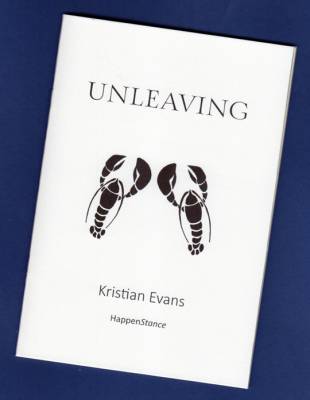 This is titled Unleaving, is sixteen pages long, and has a black and white cover design of what might feature two lobsters. It is published by Nell Nelson of HappenStance Press, of Glenrothes, Fife, whose website describes Evans as a close observer of the expressions of the natural world and its dialogue with poetic tradition. But he’s ready and willing to test our conventions and expectations. Prose or poetry? In this, his first collection, the borderlines are blurred and burnished.
This is titled Unleaving, is sixteen pages long, and has a black and white cover design of what might feature two lobsters. It is published by Nell Nelson of HappenStance Press, of Glenrothes, Fife, whose website describes Evans as a close observer of the expressions of the natural world and its dialogue with poetic tradition. But he’s ready and willing to test our conventions and expectations. Prose or poetry? In this, his first collection, the borderlines are blurred and burnished.
In the audience is Cary Archard, creator of another publishing house, Seren Books. Archard is here to run the rule over the new poet. And Kristian Evans is nervous because Archard has arrived.
Nervous because their relationship goes back to when this writer was aged fourteen and Cary Archard his English teacher in Brynteg Comprehensive in Bridgend, where Evans was notorious for truancy. For cutting classes and discovering himself on the banks of the Ogwr or Ewenni rivers, or amidst the sandhills of Merthyr Mawr, experimenting with lysergic acid.
Amongst the few lessons Evans deigned to attend were those of Cary Archard. In fact, the newly published writer is certain it was Archard who ‘turned him on to poetry’. Better words for what Archard accomplished might be ‘enthused’, ‘excited’, ‘enabled’, ‘inspired’ – the mental chemistry we all hope a teacher is able to create.
On November 27, 2015, Nell Nelson arrives in Porthcawl for the second launch of Unleaving. She knows nothing of the new poet’s childhood but has taken the immense step of publishing his work. No-one told Cary Archard how to motivate his pupils, or how to begin the work that created Seren Books. No-one suggested to Nell Nelson she should assemble ‘Unleaving’, with its versions from the Welsh, the French, its journal fragments, its shattered sonnets, its title possibly out of Manley Hopkins, its evidence of tentative poetic intelligence, of omnivorous reading, of ambition.
Those two events mark the arrival of a writer whose work is worth purchasing. As it stands, Unleaving is a modest publication, retailing at £5, a snowflake in our cultural blizzard. If we pick it up we read first the writer’s name. But most art is an iceberg. I know that because I can comprehend some of the time, the effort, the love behind this enterprise. The investment already made in Kristian Evans is astonishing. Unleaving is the fruition of the work of three extraordinary people. That is why its publication is my cultural highlight of the year.
Gee Williams
For the better part of the year it seemed I was looking for highlights in all the wrong places. Films I’d waited to see offered a ‘yeah, but…’ response. Books? I’ve no fiction so memorable I wouldn’t have to check the shelves for titles – though in non-fiction Selfish, Shallow and Self-Absorbed edited by Meghan Daum’ pressed my (I guess) selfish, shallow etc, button. By October I’m losing hope. Then comes Tony Harrison and his partner, the actress Siân Thomas, at the Chester Literature Festival.
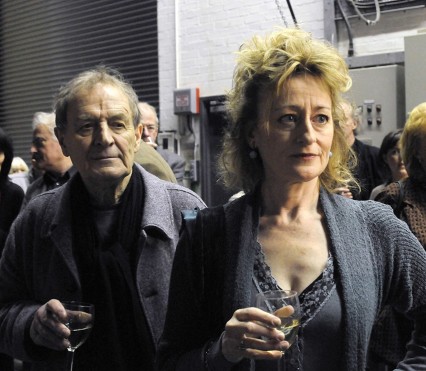 Chester’s Gothic Town Hall, symbolic of the first real Northern Power House: much anticipation and then came the bathos of not-the-poet but an actor’s mannered performance of Harrison’s Gulf War poem, A Cold Coming. (The jabbing cruelty of some couplets could still draw blood though: ‘If that gadget of yours records/words from such scorched vocal chords,/ press RECORD before some dog/devours me mid-monologue…’ pleads the dead Iraqi.) Next is an uncomfortable interview with the festival director where you longed for more open questions, something to let a poet still at the top of his game give us a glimpse into the mechanism. Here is the man with ‘the trick of it’ but to a restless crowd all that was on offer seemed like attenuated foreplay. We needn’t have worried. Harrison and Thomas take to the stage and the atmosphere crackles with their personal chemistry. Suddenly we’re totally in awe of the made metrical line and shocked by the power of Thomas’ ability to deliver it. There’s nothing comfortable nor nostalgic when Harrison reads some of the earlier short poems many present will know and love. But when Thomas becomes a starving woman driven to cannibalism, or the apologetic mother of a monster (the Emperor Commodus, so no mean monster) by language and dramatic dexterity we were transported to a freezing city under siege, a blood-soaked arena. It’s what the Greeks invented poetry and plays for.
Chester’s Gothic Town Hall, symbolic of the first real Northern Power House: much anticipation and then came the bathos of not-the-poet but an actor’s mannered performance of Harrison’s Gulf War poem, A Cold Coming. (The jabbing cruelty of some couplets could still draw blood though: ‘If that gadget of yours records/words from such scorched vocal chords,/ press RECORD before some dog/devours me mid-monologue…’ pleads the dead Iraqi.) Next is an uncomfortable interview with the festival director where you longed for more open questions, something to let a poet still at the top of his game give us a glimpse into the mechanism. Here is the man with ‘the trick of it’ but to a restless crowd all that was on offer seemed like attenuated foreplay. We needn’t have worried. Harrison and Thomas take to the stage and the atmosphere crackles with their personal chemistry. Suddenly we’re totally in awe of the made metrical line and shocked by the power of Thomas’ ability to deliver it. There’s nothing comfortable nor nostalgic when Harrison reads some of the earlier short poems many present will know and love. But when Thomas becomes a starving woman driven to cannibalism, or the apologetic mother of a monster (the Emperor Commodus, so no mean monster) by language and dramatic dexterity we were transported to a freezing city under siege, a blood-soaked arena. It’s what the Greeks invented poetry and plays for.
Mark Blayney
I have a small son now so my nights out are a bit different to how they used to be. One of the unexpected pleasures of being a new parent is going to things you might otherwise have missed. In Hanoi this year I went to the Water Puppet Theatre – an ancient tradition on a par with Balinese shadow puppets and Czech marionette theatre, but not nearly as well-known.
Through a series of short vignettes, scenes of traditional country life – steering water buffalo, reaping harvests, falling in love and fighting monsters – are enacted by engaging, lively rod-puppets. Anyone who loves animated theatre will tell you that the range of emotions that can be expressed by a painted wooden face is remarkable – it’s a conjuring trick enacted by extremely deft performers.
In this particular show the challenge is not just to keep out of sight and engineer moves that you can’t actually see yourself. The mechanics do actually take place underwater, with the performers controlling the puppets from somewhere behind and under the waves. The characters break the surface and play and splash and drive boats, and for my year-old son – witnessing his first piece of theatre – the effect was magical.
So – and parents will understand this – I spend half the show watching the drama and half the show watching my son. We could almost see this new experience imprinting itself across his developing brain as we watched.
Hanoi is a crazy place; a motorbike mecca. Traffic lights are cosmetic – pretty Christmas tree lights that flash red and green as everyone zooms by. The pavements are full with parked motorbikes so you walk in the street, weaving in and out of lanes of traffic. You learn to ignore the bikes that come straight towards you because they’ll go round if you keep a steady pace. Where there is a rare patch of unoccupied pavement people play badminton on it, or cook, or sit on little blue stools and smoke. It’s an experience, in the best sense of the word, and the only way to get through it is to let it wash across you.
So it was a blissful experience to escape to the lake where the puppet theatre is, away from the relentless whirr of bikes for an hour or so and listen to the gentle lapping of water and the moral fables of the past. If you go, go.
Valerie Sirr
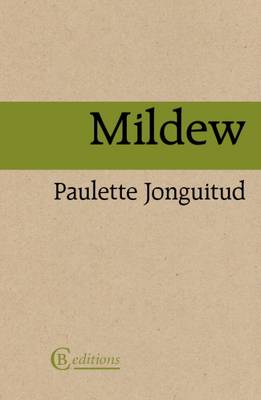 An unusual short novel and with huge scope, Mildew, by Mexican writer Paulette Jonguitud (CB Editions, 2015) elegantly translated from the Spanish by the author is an astonishing, mythical tale of a very strange manifestation of one woman’s ‘out, damned spot!’ increasing guilt and intense rage provoked by a relationship with another woman/daughter figure. Reminiscent of some of the films of Pedro Almodovar, the story is both psychological and magical; the narrative explores womanhood, the female body, the complexity of female relationships, sex, motherhood, betrayal, aging and ultimately rot, as in the eponymous ‘mildew’ – the imagery of which cleaves to the inside of your head, as does her childhood perspective of the gardens of Hieronymous Bosch, like her Christian nuns’ teachings about hell; an aborted fetus she names ‘Rafael’; and the perfect body of her husband’s supposed mistress.
An unusual short novel and with huge scope, Mildew, by Mexican writer Paulette Jonguitud (CB Editions, 2015) elegantly translated from the Spanish by the author is an astonishing, mythical tale of a very strange manifestation of one woman’s ‘out, damned spot!’ increasing guilt and intense rage provoked by a relationship with another woman/daughter figure. Reminiscent of some of the films of Pedro Almodovar, the story is both psychological and magical; the narrative explores womanhood, the female body, the complexity of female relationships, sex, motherhood, betrayal, aging and ultimately rot, as in the eponymous ‘mildew’ – the imagery of which cleaves to the inside of your head, as does her childhood perspective of the gardens of Hieronymous Bosch, like her Christian nuns’ teachings about hell; an aborted fetus she names ‘Rafael’; and the perfect body of her husband’s supposed mistress.
Like Kafka’s Gregor Samsa, she awakes to find her body transformed, or rather in the process of being transformed in her case, into a creeping fungus, beginning with a green spot ‘It looked like a mole, irregular in form and velvety to the touch. It seemed to be covered by grey powder…It was dark in the centre, olive green, and its edges were lighter. I separated the skin where I had cut myself and saw that the green went down and into the flesh.’
Her daughter is getting married the next day, there is marital conflict and other issues including a ‘beautiful and irresponsible’ internalised mother whose ‘Look how dirty you are!’ refrain intrudes throughout this nightmarish narrative as do other intrusive thoughts of possible wrongdoing while all the time the green spot grows, eventually covering her body, like a symbol of unspoken shame, ‘I won’t talk’, that eventually erupts.
Adding to the pleasure of this find is the vintage style cover, used in CB editions’ books. To quote from the website: ‘The covers of the books, which (with the occasional exception) feature simply the title and author’s name on manilla board, allude with respect and thanks to the paperback London Magazine editions published by Alan Ross in the late 1960s and early 70s.’
Gary Raymond
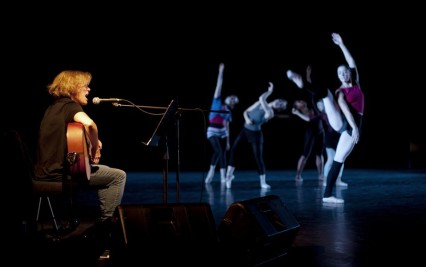 The purpose of art is to remind us of who we are, but it is also to set us free. I forget who said that (or words to that affect), but there is abundant truth in its simplicity. 2015 has hit some heights, and singling one highlight was going to be a daunting task, until the night of Ballet Cymru’s triple bill at the Riverfront in Newport. The reason is embodied in that quote, but it was for the artists on this occasion as much as it could ever have been for the audience. It was the company’s first performance after the sudden and tragic death of Mandev Sokhi, a central figure to Ballet Cymru not only as a dancer, but as education officer and an integral part of their outreach and community projects. BC’s artistic director Darius James told me after the show that he had spoken to the players and was prepared to cancel the upcoming tour, but they unanimously voiced their desire to go on with it. Tragedies like this have been known to sink companies in the past, not just tours, but here they were, with the wonderful Emily Pimm-Edwards and the electrifying Daisuke Miura returned as guests to roles they had formally made their own when permanent members, paying tribute to their departed friend in the most appropriate manner they could. And it was a series of performances of the highest quality – indeed in some areas it reached heights I may have been guilty of believing beyond such a small company that spends so much of its time as it is punching above its weight.
The purpose of art is to remind us of who we are, but it is also to set us free. I forget who said that (or words to that affect), but there is abundant truth in its simplicity. 2015 has hit some heights, and singling one highlight was going to be a daunting task, until the night of Ballet Cymru’s triple bill at the Riverfront in Newport. The reason is embodied in that quote, but it was for the artists on this occasion as much as it could ever have been for the audience. It was the company’s first performance after the sudden and tragic death of Mandev Sokhi, a central figure to Ballet Cymru not only as a dancer, but as education officer and an integral part of their outreach and community projects. BC’s artistic director Darius James told me after the show that he had spoken to the players and was prepared to cancel the upcoming tour, but they unanimously voiced their desire to go on with it. Tragedies like this have been known to sink companies in the past, not just tours, but here they were, with the wonderful Emily Pimm-Edwards and the electrifying Daisuke Miura returned as guests to roles they had formally made their own when permanent members, paying tribute to their departed friend in the most appropriate manner they could. And it was a series of performances of the highest quality – indeed in some areas it reached heights I may have been guilty of believing beyond such a small company that spends so much of its time as it is punching above its weight.
Mandev was never far from the stage – a breezing absence at his mark for each of the set-pieces he was involved with. Each movement was a few steps further toward that special transcendent experience because of the rising of the artists. Cerys Matthews on stage with acoustic guitar played and sang the Welsh folk songs with coruscating realness – you have to wonder if she has ever sounded better. The songs, expounding on the usual folk tropes of lost love and mysticism, this night took on an edge that crossed them from that mercurial dimension right to the crux of this tragic memorial. This was a troupe relinquished to the movement of their mood, expressing their grief, their defiance and their familial bond. The night crackled throughout, but at the final curtain there was a poignant punctuation mark as Lydia Arnoux, who for so long had been the Beauty to Mandev’s Beast gave way to tears as the bows were taken – and although heartbreaking to see, it also served as a remarkable symbol of Ballet Cymru’s fortitude in the face of such tragedy, and how the performers had given the greatest collective display of their skills they had ever given, and how they had channelled their grief into their art for a few elating, mesmerising hours.
Jemma Beggs
My highlight of 2015 is not a single piece of culture, but an accumulation of stories which have snuck up on me throughout the year, their host establishing itself as an unmissable part of my weekly reading routine. They all belong to The Writer’s Arena – an online battleground which hosts epic duels of the short story nature between a variety of writers.
Each week one arena writer takes on a member of the audience to determine who can produce the winning story in response to the set prompt. Two judges choose their favourite, with the third vote being cast by the audience to determine the overall winner. In short, this is everything I have ever wanted from a short story website – a Hunger Gamesesque battle of the literary world.
It has also given me some of my favourite stories of 2015. I have been frequently dazzled by plots I would never have expected, from what are often the simplest of prompts. The quality of the narrative around the stories themselves is another key aspect of what makes The Writer’s Arena so captivating. There is so much fun and imagination crammed into every audience interaction, which makes it feel amazing to be part of a community which is so obviously in love with the art of writing.
You never can predict what you will find week to week on The Writer’s Arena, but you can always expect two spectacular stories. Currently in hibernation until the New Year, this could be the perfect time to explore the archives and I would highly recommend you start with, possibly my all-time favourite arena story, ‘Pillow’ by Hannah-Elizabeth Noelle Thompson. Let the battle commence.
Shauna Gilligan
December is the month of lists. Things to do, to see, to read. Promises of becoming, of starting again. The new year. But in this era of compression and sound bites, what constitutes favourite in the cultural sense of the word? Is it the importance – and knowledge creation – of the event? Maybe it is to do with the experience of collective joy? Or perhaps it is something less tangible, an emotional shiver which stays?
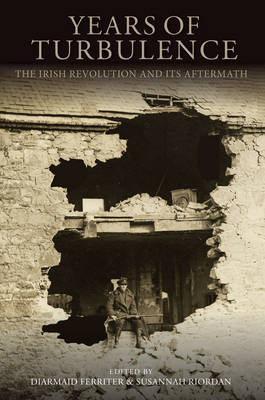 In my selection, I’ve gone for a combination of all three. I’m a writer, but before I was a writer, I was an historian. And before that, a curious child. In early December 2015, I contributed a chapter to and attended the launch of a feischrift in honour of Professor Michael Laffan who supervised my MA history thesis in University College Dublin. Years of Turbulence: The Irish Revolution and its Aftermath (Edited by Diarmaid Ferriter and Susannah Riordan and published by UCD Press) is a wonderful collection of writing which presents a turbulent period in Irish history through a number of alternative lenses.
In my selection, I’ve gone for a combination of all three. I’m a writer, but before I was a writer, I was an historian. And before that, a curious child. In early December 2015, I contributed a chapter to and attended the launch of a feischrift in honour of Professor Michael Laffan who supervised my MA history thesis in University College Dublin. Years of Turbulence: The Irish Revolution and its Aftermath (Edited by Diarmaid Ferriter and Susannah Riordan and published by UCD Press) is a wonderful collection of writing which presents a turbulent period in Irish history through a number of alternative lenses.
At the launch, standing in the elegant interior of the stunning Georgian Newman House in Dublin, I chatted with lecturers I had not seen in many years. Surrounded by historians and the talk of fact, I realised how important the grounding in blending curiosity, research and creativity that I received in my early years has been in my fiction writing. The approach of the historian, using artifacts such as election posters, diaries, letters, recorded conversations, and so on, is not so different to that of the novelist.
And so, my favourite cultural moment of 2015 was the launch of a book produced in honour of someone who cemented in others the love of curiosity and the possibilities of research. It serves, for me, as a reminder of how often, as writers, we return where we once started – in an attempt to find that energy and curiosity of youth – the point when and where we discovered how to learn. It speaks of the importance of the give and take of teaching and learning, and how important the past is in our understanding of our present. As the educator Paulo Freire says in Pedagogy of the Oppressed
The more radical the person is, the more fully he or she enters into reality so that, knowing it better, he or she can transform it. This individual is not afraid to confront, to listen, to see the world unveiled.
And surely that is part of the role of culture in our society – to enable us to see the world unveiled, to enable transformation and bring us to the childhood point of marvel, re-igniting our curiosity, and giving us joy.
Bethany W. Pope
Justin Kurzel’s cinematic take on Shakespeare’s Macbeth will turn out to be one of the most important cultural events of the year. Doing justice to such vivid, living material is always a difficult task; encouraging prejudiced ‘mainstream’ audiences to view it (when they are probably still aching from badly-taught A-level Literature) is necessary work, and it requires an almost herculean effort. Kurzel pulls it off.
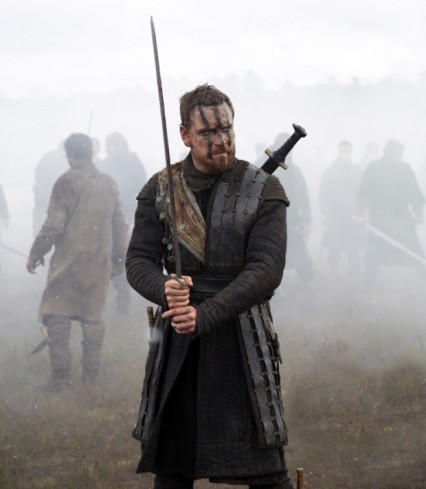 Michael Fassbender portrays Macbeth as a warrior who has been eaten alive by the pressures of battle and the aftermath of PTSD. He’s a husk when we meet him; intelligent, yes, and patinated with a thin wash of remnant nobility, but he’s still a walking dead-man who becomes convinced that kingship can shore up the fragmented ruins of his character. The resulting dissolution of his psyche is terrifying (and fascinating) to watch.
Michael Fassbender portrays Macbeth as a warrior who has been eaten alive by the pressures of battle and the aftermath of PTSD. He’s a husk when we meet him; intelligent, yes, and patinated with a thin wash of remnant nobility, but he’s still a walking dead-man who becomes convinced that kingship can shore up the fragmented ruins of his character. The resulting dissolution of his psyche is terrifying (and fascinating) to watch.
The violence in the battle scenes is realistic (brutal, brief; utterly without pomp) and the dialogue is delivered in a natural, heartbreaking way. Sean Harris gives the best performance of MacDuff that I have ever seen; on stage, or off it. When his character learns about the death of his family his grief is palpable. He weeps with that sort of raw, helpless heave that makes it difficult to breathe. Such pain is contagious.
I think that the critics are underrating this film because while the script is treated with the utmost seriousness (as though it were an actual, historical event) it isn’t at all refined. The script is not on a pedestal; it’s with the actors, rolling around in the bloody earth. Macbeth isn’t a safe play. Nor should it be; it’s themes are violence, power, and the deep, unhealable scars left behind by war. That’s dangerous material and, in the capable hands of this director, it has been translated into an unsettling and deeply unsafe film. I left the theatre feeling like one is supposed to after viewing a tragedy; purged, aching, ready for some holy revelation. Go see it, if you can.
Tom Vowler
In March I navigated Devon’s gloaming, bucolic lanes to watch comedy’s version of the short story: Stewart Lee. Why the facetious analogy? Perhaps because both enjoy a cult, minority status, one where irony, intellect and a playful contempt predominate. In short: they are both a bit difficult. Not for everyone. Too clever for their own good. They are slippery, alienating creatures, but ones with which you have a heightened, almost religious relationship. Certainly in both cases the audience/reader must do a fair share of the work themselves: there is no free ride, no light entertainment here. Lee, as the short story is to badly-written genre fiction, is the antidote to the legions of vapid, mainstream onanists, who spoon-feed you their inane one-liners, a boys’ (for it almost always is) club of panel-show self-congratulists.
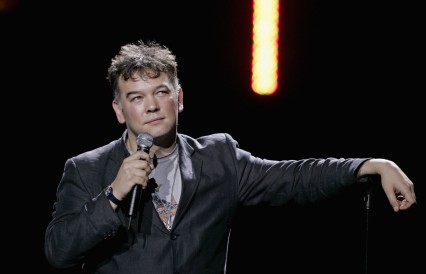 As if to further align himself with literature’s most demanding form, Lee played that night in a village hall to around 150 people (presumably he owed a favour to a friend on the parish council, having already toured all the iconic gig venues in the UK). The intimacy might have overwhelmed a more egoistic sleb; for Lee it was the chance to amplify his faux-mocking style: ‘Come on, Lustleigh – raise your game,’ he scorned, as we responded with nervous laughter to subjects no doubt chosen to elicit our discomfort. As with the short story, much of Lee’s act is found in its silences and spaces, in the repeating motifs and subtexts, which embed themselves subliminally, stirring you a few nights or weeks later.
As if to further align himself with literature’s most demanding form, Lee played that night in a village hall to around 150 people (presumably he owed a favour to a friend on the parish council, having already toured all the iconic gig venues in the UK). The intimacy might have overwhelmed a more egoistic sleb; for Lee it was the chance to amplify his faux-mocking style: ‘Come on, Lustleigh – raise your game,’ he scorned, as we responded with nervous laughter to subjects no doubt chosen to elicit our discomfort. As with the short story, much of Lee’s act is found in its silences and spaces, in the repeating motifs and subtexts, which embed themselves subliminally, stirring you a few nights or weeks later.
Perhaps Lee’s politics – or at least those adorning his ‘act’ (think Jez not Dave) – seduce me, muddying my judgement of his comedic aesthetic. Certainly the two are inextricably bound, though never in a crass (and as it turned out, specious) Ben Elton-esque way. Lee’s skill, as with the short story, is in turning the mirror on his audience, luring them into a sense of comfort, only to gloriously betray this trust, playing mischievously with the line between character and self, between author and reader. A truly unreliable narrator.
There’s a routine (easily found via all good search engines) in which Lee is flippant (and worse) about Top Gear’s Richard Hammond and his near-fatal car crash. It is both brutal and shocking, until you realise Lee is pastiching the programme’s own cynical insensitivity and bigotry to parody it, at which point it becomes hilarious. His routine on political correctness is also gloriously original.
Lee is often touted the comedians’ comedian, as it is often said only writers of short stories read them. A well-kept secret. But with both, it’s becoming a secret harder to keep. Lee would be high on my list of best-dinner-party-guests-if-you-could-have-anyone, right up to the point he turned the mirror on me.
For Part Two of our 2015 Highlights List click here












